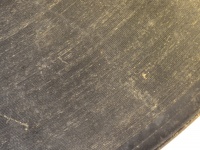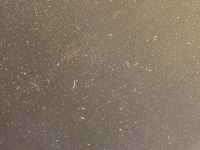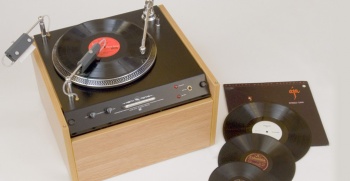Difference between revisions of "WMCH:Call for projects 2014:Public Domain Project"
(→Cleaning) |
|||
| (17 intermediate revisions by 2 users not shown) | |||
| Line 34: | Line 34: | ||
=== Project scope and list of activities=== | === Project scope and list of activities=== | ||
| − | + | The Public Domain Project focuses on the following three activities in the upcoming year: | |
| − | |||
| − | |||
| − | |||
| − | |||
| − | |||
| − | |||
| − | |||
| − | === | + | ==== Digitizing ==== |
| − | + | In order to digitize the music records it is inevitable to know the birth- and death date of the creator. Therefore these dates must be carefully identified which is a very time-intense and complex task. With the help of Discographic Encyclopedias this process can be much facilitated. | |
| − | + | ==== Cleaning ==== | |
| + | The condition of most of the music records of the collection of the Public Domain Project are "dirty". Therefore it is inevitable to clean the records in order to digitize them in a second step. This cleaning process is also done by hand supported by a record cleaning machine. This machine ensures that the dirt solved in the cleaning solution is completely removed from the record - the record is then dry and ready for digitization. | ||
| − | Example: | + | :{| |
| + | |[[Image:Very_dirty_schellack_record.jpg|200px|left|thumb|Example of a very dirty record. Shows what can happen during over 60 years of bad storage]] | ||
| + | |[[Image:Clean_schellack_record_just_some_loose_dust.jpg|200px|left|thumb|A lucky example: A clean record in near factory new condition. The light dust is loose so it is easy to remove it with a carbon brush]] | ||
| + | |[[Image:Monks-mk5.jpg|350px|left|thumb|The Keith Monks 'Archivist Duo Omni' - RCM Mk.IX cleans 7" up to 16" gramophone records]] | ||
| + | |} | ||
| − | - | + | ==== Archiving ==== |
| + | To guarantee the long term existence of the music records, there is a need for professional archiving. This can best be done in a conditioned and secured room. Furthermore the music records need to be archived in special wooden containers. | ||
| + | === Non-financial requirements === | ||
| + | 10 Volunteers that are supporting the digitalization of the music records in order to be able to digitize more records in a shorter period of time. | ||
=== Fit to strategy === | === Fit to strategy === | ||
| − | + | On one hand this project allows the increase of the quantity of music files on Wikimedia Commons. On the other hand the project guarantees very high quality of digitized music. Both characteristics go perfectly along with the overall strategy of the Wikimedia movement. | |
| − | |||
| − | |||
| − | |||
| − | |||
| − | |||
| − | |||
| − | |||
| − | |||
| − | |||
| − | |||
| − | |||
=== Fit to a community demand === | === Fit to a community demand === | ||
| − | + | The Public Domain Project opens a new field of activitiy to the WMCH volunteers. | |
| − | |||
| − | |||
| − | |||
| − | |||
| − | |||
=== Other benefits === | === Other benefits === | ||
| − | + | Pioneer Project for Switzerland - with an inimitable collection of music records. | |
| − | |||
| − | |||
| − | |||
=== Measures of success === | === Measures of success === | ||
| − | + | A quantitative measure of success will be the number of digitized records which are uploaded to [https://commons.wikimedia.org/w/index.php?title=Special%3AListFiles&limit=50&user=Pdproject Wikimedia Commons] by the end of the year 2014. By our count, the Public Domain Project will be able to digitize 5'000 of the available 78 rpm recordings by the end of the year 2014 - If there will be support from civilian helpers and volunteers of WMCH. | |
| − | + | If there is no assistance out of the community, the Public Domain Project will be able to approximately digitize 250 recordings. | |
| − | + | We can not guarantee that all music works are public domain, therefore, we expect 2'500 new uploads to Wikimedia Commons after the time-consuming evaluation of copyrights. | |
| − | - | + | The qualitative measures of success will be the added value of high-grade music files on Wikimedia Commons which can be used to enrich numerous articles on Wikipedia. |
=== Budget breakdown === | === Budget breakdown === | ||
| + | The Budget consists of the following three positions: | ||
| + | ==== CHF 5'000 ==== | ||
| + | Purchase of "second hand" Discographic Encyclopedias (complete series of the major labels). This allows the identification of the production data (1st release and date of recording; performer and authorship) of each 78 rpm record. With this information available, the identification of the authorship is easier. This allows more uploads to Wikimedia Commons. | ||
| + | ==== CHF 5'000 ==== | ||
| + | Purchase of a "record cleaning machine" [http://www.keithmonks-rcm.co.uk/mkv.html The Keith Monks 'Archivist Duo' - RCM Mk.V] ([http://www.youtube.com/watch?v=n7QF8yZAIB4 demo video]) to be able to clean the dirty 78 rpm records (7-inch, 10-inch, 12-inch and up to 16-inch) in order to digitize them. | ||
| + | <br>'''Please note:''' only 1'000 records are already cleaned and ready to be digitized. With this cleaning machine it would be possible to clean and digitize another 49'000 78 rpm records.'' | ||
| − | + | ==== CHF 5'000 ==== | |
| − | + | To finance the alternative civilian service for six month which help in the digitization and investigation of copyrights to maximize the output. | |
| − | |||
| − | |||
| − | |||
| − | |||
| − | |||
| − | + | '''Budget Total of CHF 15'000''' | |
=== Team members (optional) === | === Team members (optional) === | ||
| Line 109: | Line 92: | ||
== See also== | == See also== | ||
| − | * [https://members.wikimedia.ch/ | + | * [http://audio-restoration.com/monks5.php#rcmtop Audio-Restoration page about the Keith Monks RCM] |
| + | * [https://members.wikimedia.ch/Call_for_projects_2013 Call for projects 2013] (members only) | ||
* [https://members.wikimedia.ch/Call_for_projects_2014 Call for projects 2014] (members only) | * [https://members.wikimedia.ch/Call_for_projects_2014 Call for projects 2014] (members only) | ||
| + | * [https://members.wikimedia.ch/Public_Domain_Project Original draft at WMCH] (members only) | ||
[[Category:WMCH:Projects]] | [[Category:WMCH:Projects]] | ||
Latest revision as of 05:43, 23 January 2014
Full project name: Public Domain Project
Legal name of organization or individual submitting this grant: Swiss Foundation Public Domain
Project nature: Volunteer driven
Project contact name: Carl Flisch
Project contact username or email: fuchur(at)pdproject.org
Project contact title (position): Member of the Board (Secretary)
Project contact affiliation:
Category: GLAM
Working group associated, if any:
Matching founds: none
Conflict of interest: none
Other partners: Init Seven AG, Wikimedia Deutschland, Zurich University of the Arts
Provisional target start date: 1 January 2014
Provisional completion date: 31 December 2014
Contents
[hide]Project goal
The Public Domain Project is a open-minded (open to all people) project under the supervision of the Swiss Foundation Public Domain. The major activity is the conservation and utilization of public domain music and film material. Our archives includes over 50,000 78 rpm records, cylinders and discs of Edison and Pathé that we have to clean and digitize.
Project scope and list of activities
The Public Domain Project focuses on the following three activities in the upcoming year:
Digitizing
In order to digitize the music records it is inevitable to know the birth- and death date of the creator. Therefore these dates must be carefully identified which is a very time-intense and complex task. With the help of Discographic Encyclopedias this process can be much facilitated.
Cleaning
The condition of most of the music records of the collection of the Public Domain Project are "dirty". Therefore it is inevitable to clean the records in order to digitize them in a second step. This cleaning process is also done by hand supported by a record cleaning machine. This machine ensures that the dirt solved in the cleaning solution is completely removed from the record - the record is then dry and ready for digitization.
Archiving
To guarantee the long term existence of the music records, there is a need for professional archiving. This can best be done in a conditioned and secured room. Furthermore the music records need to be archived in special wooden containers.
Non-financial requirements
10 Volunteers that are supporting the digitalization of the music records in order to be able to digitize more records in a shorter period of time.
Fit to strategy
On one hand this project allows the increase of the quantity of music files on Wikimedia Commons. On the other hand the project guarantees very high quality of digitized music. Both characteristics go perfectly along with the overall strategy of the Wikimedia movement.
Fit to a community demand
The Public Domain Project opens a new field of activitiy to the WMCH volunteers.
Other benefits
Pioneer Project for Switzerland - with an inimitable collection of music records.
Measures of success
A quantitative measure of success will be the number of digitized records which are uploaded to Wikimedia Commons by the end of the year 2014. By our count, the Public Domain Project will be able to digitize 5'000 of the available 78 rpm recordings by the end of the year 2014 - If there will be support from civilian helpers and volunteers of WMCH.
If there is no assistance out of the community, the Public Domain Project will be able to approximately digitize 250 recordings.
We can not guarantee that all music works are public domain, therefore, we expect 2'500 new uploads to Wikimedia Commons after the time-consuming evaluation of copyrights.
The qualitative measures of success will be the added value of high-grade music files on Wikimedia Commons which can be used to enrich numerous articles on Wikipedia.
Budget breakdown
The Budget consists of the following three positions:
CHF 5'000
Purchase of "second hand" Discographic Encyclopedias (complete series of the major labels). This allows the identification of the production data (1st release and date of recording; performer and authorship) of each 78 rpm record. With this information available, the identification of the authorship is easier. This allows more uploads to Wikimedia Commons.
CHF 5'000
Purchase of a "record cleaning machine" The Keith Monks 'Archivist Duo' - RCM Mk.V (demo video) to be able to clean the dirty 78 rpm records (7-inch, 10-inch, 12-inch and up to 16-inch) in order to digitize them.
Please note: only 1'000 records are already cleaned and ready to be digitized. With this cleaning machine it would be possible to clean and digitize another 49'000 78 rpm records.
CHF 5'000
To finance the alternative civilian service for six month which help in the digitization and investigation of copyrights to maximize the output.
Budget Total of CHF 15'000
Team members (optional)
Remarks
See also
- Audio-Restoration page about the Keith Monks RCM
- Call for projects 2013 (members only)
- Call for projects 2014 (members only)
- Original draft at WMCH (members only)


